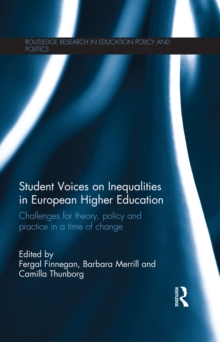
Middle-class School Choice in Urban Spaces : The economics of public schooling and globalized education reform Paperback / softback
by Emma Rowe
Part of the Routledge Research in Education Policy and Politics series
Paperback / softback
Description
Middle-class School Choice in Urban Spaces examines government-funded public schools from a range of perspectives and scholarship in order to examine the historical, political and economic conditions of public schooling within a globalized, post-welfare context.
In this book, Rowe argues that post-welfare policy conditions are detrimental to government-funded public schools, as they engender consistent pressure in rearticulating the public school in alignment with the market, produce tensions in serving the more historical conceptualizations of public schooling, and are preoccupied by contemporary profit-driven concerns.
Chapters focus on public schooling from different global perspectives, with examples from Chile and the US, to examine how various social movements encapsulate ideologies around public schooling.
Rowe also draws upon a rich, five-year ethnographic study of campaigns lobbying the Victorian State Government in Australia for a brand-new, local-specific public school.
Critical attention is paid to the public school as a means to achieve empowerment and overcome discrimination, and both a local and global lens are used to identify how parents choose the public school, the values they attach to it, and the strategies they use to obtain it.
Also considered, however, are how quality gaps, distances and differences between public schools threaten to undermine the democracy of education as a means for individuals to be socially mobile and escape poverty. This book makes an important contribution to our understanding of global social movements and activism around public education.
As such, it will be of key interest to researchers, academics and postgraduate students in the field of education, specifically those working on school choice, class and identity, as well as educational geography.
Information
-
Out of stock
- Format:Paperback / softback
- Pages:216 pages, 11 Tables, black and white; 11 Line drawings, black and white; 11 Halftones, black and wh
- Publisher:Taylor & Francis Ltd
- Publication Date:01/06/2018
- Category:
- ISBN:9781138613713
Other Formats
- EPUB from £24.29
- PDF from £24.29
- Hardback from £145.00
Information
-
Out of stock
- Format:Paperback / softback
- Pages:216 pages, 11 Tables, black and white; 11 Line drawings, black and white; 11 Halftones, black and wh
- Publisher:Taylor & Francis Ltd
- Publication Date:01/06/2018
- Category:
- ISBN:9781138613713










